S&P Global Offerings
Featured Topics
Featured Products
Events
S&P Global Offerings
Featured Topics
Featured Products
Events
S&P Global Offerings
Featured Topics
Featured Products
Events
Banking & Capital Markets
Economy & Finance
Energy Transition & Sustainability
Technology & Innovation
Podcasts & Newsletters
Banking & Capital Markets
Economy & Finance
Energy Transition & Sustainability
Technology & Innovation
Podcasts & Newsletters
S&P Global Offerings
Featured Topics
Featured Products
Events
20 Mar, 2025
By Kip Keen
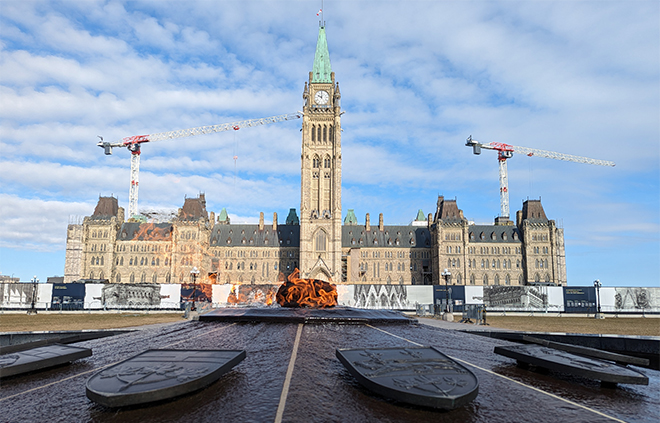
| Canada's parliament in Ottawa. Canada's governing Liberals may soon call for a federal election. Source: S&P Global Commodity Insights. |
The mining sector is set to win however Canada votes in an upcoming election, industry participants told Platts, part of S&P Global Commodity Insights.
Prime Minister Mark Carney — fresh off a Liberal Party leadership race win — plans to ask the country's governor general on March 23 to dissolve Canada's parliament and call an election, according to media reports citing unnamed sources. If so, Canadians will likely head to the polls in late April or early May and decide whether the Liberals retain power after a decade leading the country.
Liberals and Conservatives, the two main parties that historically win Canadian elections, will seek to draw stark differences on social and economic issues in coming campaigns. But on mining, there may be relatively little to separate them as political leaders look to bolster the domestic economy in the face of US tariffs, which risk sending the country into recession.
"The narrative for mining has flipped," David Harquail, chair of Franco-Nevada Corp., a precious metals and energy streaming and royalty giant, said in an email. "Mining can now be a positive that either government can advance independent of [US President Donald] Trump. Very positive for the industry."
Mining first
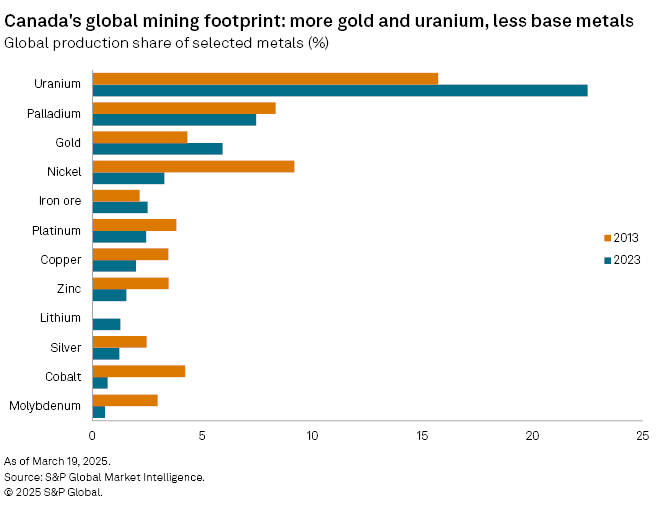
In recent years Canada's left-leaning Liberals seized on mining and metals as crucial to the energy transition and sought to back the sector through policies and funding.
Now, Trump and his administration's hard-hitting tariffs on Canada and, separately, on aluminum, a major Canadian export to the US, have added urgency to Canadian efforts to boost the mining sector.
"Mining will weather the tariff war better than other sectors and so it makes sense for governments to double down on mining," Pierre Gratton, president and CEO of the Mining Association of Canada, told Platts. "New mining investment can protect the Canadian economy."
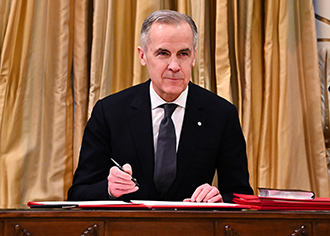 |
| Mark Carney, Canada's prime minister and leader of the Liberal Party. Source: Minas Panagiotakis/Getty Images. |
While Carney's views of the mining sector are not well known, the former central banker has emphasized the need to curb some government spending and develop a stronger economy.
"Canada must diversify and expand its trading relationships by becoming an essential partner for like-minded countries, drawing on our vast resources of conventional and clean energy, critical metals and minerals, leadership in [artificial intelligence] and deep human capital," Carney said in leadership race campaign material.
Carney has a business and banking background. He was the Bank of Canada's governor from 2007 to 2013 and the Bank of England's governor from 2013 to 2020. He was more recently chair of Brookfield Asset Management Ltd., a Toronto-headquartered investment management firm.
The Liberal government has taken a thoughtful approach to developing natural resources that incorporates issues related to climate change, Jonathan Wilkinson, Canada's minister of energy and natural resources, told Platts in an interview in early March. Carney understands "how you do this in a thoughtful way, including the bet that we have made on critical minerals, which I would argue is going to create hundreds of thousands of jobs across this country," Wilkinson said.
The prime minister's office did not respond to emails requesting an interview and comment.
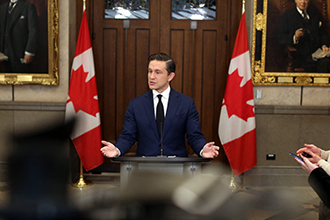 |
| Pierre Poilievre, leader of Canada's Conservative Party. Source: Dave Chan/AFP via Getty Images. |
Conservative commitments
Likewise, Pierre Poilievre, leader of the Conservative Party, has made developing Canada's natural resources a core campaign issue.
This week Poilievre promised to spend C$1 billion over three years to co-fund crucial infrastructure needed for mining development in Ontario's remote Ring of Fire area, which is rich in metals like cobalt and nickel. He also committed to paving the way for quick permit approvals within six months of gaining power.
"We could boost our economy with billions of dollars, allowing us to become less dependent on the Americans, while our allies overseas would no longer have to rely on Beijing for these metals, turning dollars for dictators into paycheques for our people," Poilievre said in an undated statement this week.
Poilievre is a former cabinet minister in the Conservative government of Stephen Harper and has seven times been elected as a federal member of parliament. Poilievre did not respond to a request for comment.
Other parties that hold seats in Canada's parliament include the New Democratic Party (NDP), the separatist Bloc Quebecois and the Green Party. The NDP supported former Prime Minister Justin Trudeau's minority Liberal government after a 2021 election.
Tight race
The Conservatives and Liberals appear close in recent polls after a surprise shift in favor of the Liberals. CBC's poll tracker recently put the Liberals at 37.7% support against 37.4% for the Conservatives.
Until earlier this year the Trudeau government lagged far behind the Conservatives, who were widely favored to win an election over issues like Canada's unpopular carbon tax and inflation.
But after losing Liberal support, Trudeau announced in January he would resign. Carney subsequently won the party's leadership race in a landslide. Liberals surged in the polls amid the change in leadership and aggressive Trump trade policies. Trump also floated annexing Canada through economic force and repeatedly said Canada should become a US state to avoid tariffs.
The crisis over trade and the country's broader relationship with the US have suddenly become key issues in Canada's election, stealing some of the Conservatives' thunder over what the party had hoped would be an election about Canada's carbon tax, inflation and housing prices. And rather than fight the Conservatives on all those fronts, one of Carney's first moves as prime minister was to lower the consumer carbon tax to zero starting in April.
"Regardless of who forms government, we need to see more concrete action and less rhetoric," Trent Mell, founder and CEO of Electra Battery Materials Corp., told Platts. "Canada has enormous potential in this space, but we need decisive leadership and a more nimble bureaucracy to better respond in the moment."
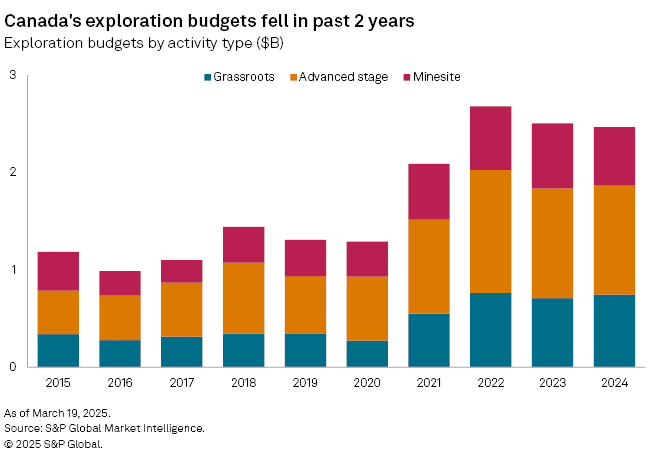
Both parties have committed to permitting and regulatory reform to speed up development of projects, though Conservatives have long said the Liberals have not done enough, especially to bolster energy projects including pipelines.
Poilievre has committed to repealing Canada's environmental assessment regime. Canadian energy companies have said Trudeau policies have held back the sector as Liberals sought to curb carbon emissions.
Now, what once looked like a sure Conservative win over these kinds of issues is a competitive fight.
"I do believe we could see some significant changes related to permitting, infrastructure support and perhaps a push to get more pension money to invest [in mining] — issues on both parties' to-do list," David Davidson, a Paradigm Capital analyst, told Platts.
